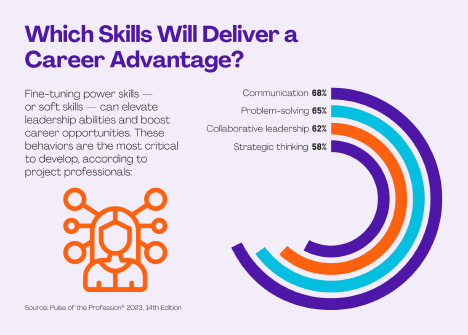AI is coming for your job but not your project team!
What is the one aspect of project management that AI can’t take away? The human touch – I believe that the key to a successful project is a successful project team. The statistics are staggering – 50% of projects fail! At the same time there is a staggering growth of PM task management systems. Meanwhile the demand for Project
Management skills is growing
Notice the skills that PMI sees as key to success – NONE of them are technical – they are all human based – that’s what delivers project success!
 Great teams don’t happen by accident
Great teams don’t happen by accident
While many of us have had that unique opportunity to work in a great team on a great project – there are so many more projects that aren’t great and teams that are miserable. I’ve often done what I call therapy retrospectives – coming in after a project that has a body count – do get to the root cause of failure. I’ve also done a lot of retrospectives where teams have said ‘we had a great team – that’s why we succeeded’. That’s all great, but how do we replicate the conditions for that success in our next project?
Teams that are resilient, creative and collaborative don’t happen by accident! As anyone who’s been thrown into a university project team, worked as a volunteer or served on a volunteer board knows – teams aren’t just a group of people arbitrarily working together even when united by a common cause. It takes work to build them and importantly to sustain them to keep the magic alive!
Don’t forget to invest in acquiring and sustaining a great team
I’ve found that there are key practices to building successful project teams – investing the time and techniques to build them and to sustain them throughout the project lifecycle. None of this replaces some key PM practices of setting an appropriate vision, managing customer expectations and other project processes, however without it none of those tools and techniques will make you and your project team successful.
Keys to success
Let’s walk through the keys to building and sustaining our project teams.
Building great teams
Project kick-off
We need to gather people, introduce them, start the ‘storming, norming, forming, and performing cycle’ as soon as possible. Also, don’t forget to include contractors and key suppliers! Thirdly, make sure you do this at key stages of your project – there are often new resources introduced at the execute phase of your project that may not have been onboard for planning – do another kick-off when this is true
Team Norms or Team Charter
- Project teams have a unique ability to create their own culture, that may be in addition to an already robust corporate focus on culture or in spite of the corporate culture. A great technique is to establish team norms or a team charter early in your project. I often develop these as part of the project kick-off. Two of my favouriate Miro templates for doing this are:
- The Team Norms template developed by Danny Carvajal is great starting place for you to customize norms for your team. I love the ability to have personal spaces and then group norms.
- The Team Work Canvas developed by BetterWorks’ is another great resource particularly because it covers such diverse aspects as meetings, decision making and communication that so closely align with our project methods.
Sustaining our team
Now that you’ve spent the time to harness the knowledge of your project team and set up the foundation for success – let’s talk about how we sustain all that good work to ensure our team actually walks the talk!
Onboarding new team members
When someone joins the team make sure you invest time onboarding them to your project and the team. Do a walkthrough of their role and spend time answering questions. Make sure they have the opportunity to fill out their personal space on your team norms or input into the Team Work canvas
Team check-ins
This can be anything for informal chats with team members, to formal retrospectives focused on the team norms. Be creative, mix it up, measure trends if you want to get nerdy, but ensure you find ways to get feedback, understand where there are issues, dive into the root cause and develop action plans when norms aren’t working or there are deviations.
Celebrating success
This isn’t about throwing big parties at the end of the project – find ways to celebrate all the little successes and personal accomplishments of the team along the way. A heartfelt thank you that includes WHY you’re thankful, ice cream cakes, use your imagination to celebrate! It can also be really powerful to have project team members recount how team members have demonstrated our norms – particularly in challenging parts of the project.
Benefits
AI will support our projects in the future in so many ways but one thing it can never replicate or take away from us is the human factor that makes for a great team and a great project. Investing in building and sustaining project teams gives:
Great projects
Great learnings between team members
New opportunities for employees to develop skills – both technical and leadership ones
Feedback?
Let me know what you think! In the comments what have you tried, what’s worked, what’s not worked. What do you long for in your project team? What resources, articles or workshops would help you get that amazing project team experience?
Really stuck – book a free 45 minute session – lets get your project team issues resolved!



Leave A Comment